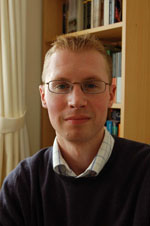Academic Library Project Cataloguer
Warwick Experience
As an undergraduate in History of Art (1998-2001), I began with an interest in early twentieth-century European painting and sculpture and ended up being devoted to thirteenth- and fourteenth-century Italian art and architecture! The range of courses included ‘Florence and Siena Before and After the Black Death’ with Dr Rupert Shepherd; ‘Paris 1850-1930’ with Dr Louise Campbell and Prof. Neil McWilliam; ‘The Body’ with Dr Michael Hatt; and ‘Rome Before Avignon’ with Prof. Julian Gardner. I was also fortunate to go through the Venice experience, which was nothing short of life-changing. These interests, the transferable skills one develops during research and the advice and support of the academic staff have all been formative and in many cases vital for my career.
Job Description
I began working at the University of York Library and Archives as a project cataloguer, which basically entailed entering bibliographic details into the library catalogue using a programme called Aleph. There was a surprising variety of material to deal with, including rare books, foreign language titles, CDs from the ECM label, DVDs and some fantastic art history publications. The job gradually developed to fit the needs of a changing academic library, and I eventually specialised in English Literature, History of Art and Linguistics, and soon after started working closely with head of the library’s special collections dealing with pre-1850 publications, prints and manuscripts. I also liaised with the Borthwick Institute of Historical Research during their merger with the University Library, working primarily on journals and publications for their searchrooms until September 2005.
Securing the Job
I applied to the University of York Library and Archives when I was in the middle of writing my MA dissertation at the same university. During the year of my MA I had offered to work in the slide library on a casual basis, which was a way of bringing some money in, but it was also a very useful way of learning about databases and systems of classification, which of course are applicable to library work. By demonstrating in the interview the connection between this experience and the requirements of the post I applied for, and a love of books, I managed to secure the job.
The Good
The library provided an excellent environment in which to put your academic experience into practice. Even a rudimentary knowledge of Italian was a valuable commodity in an institution that was purchasing large numbers of foreign language titles. Moreover, being able to tell the difference between a Romanesque panel painting and Roman wall painting is important in a post that is defined by accuracy in classification. Skills and knowledge are valued as library personnel often have strong academic backgrounds and interests, and usually find projects which utilise an individual’s aptitude.
The Not-So-Good
Working in a library is not the fast track to riches. Progression up the pay scale is contingent upon the chartership, which is the official recognition of your experience. Information Science is a challenging subject and taking a postgraduate qualification will often require you to work at the same time.
For Further Information, see …
Words of Wisdom
If you don’t ask for anything, you’ll get nothing. Buy a national paper like The Guardian for job listings or sign up to their excellent email service and read it every week. Even if you are in drowning in work for your dissertation, try to make some time in the evening or at the weekend to search for jobs, write a template for a cover letter and update your CV. It really pays off in the long run.
Contact Details
Mr Matthew Sillence
University of East Anglia
Norwich NR4 7TJ
Tel: 01603 749520
Email: m.sillence@uea.ac.uk
Our expert:
Matthew Sillence

